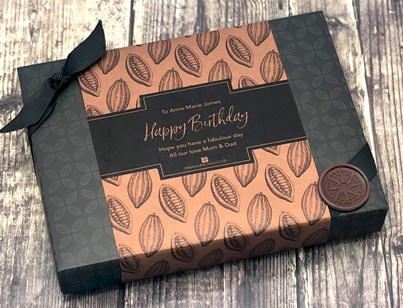Will ethical trader Green & Black’s be forced to swallow its principles along with confectionery giant’s cash?
AS an organic chocolate company set up to support the Mayan Indians of Belize, Green & Black’s became a byword for ethical and enterprising business.
But last night the firm, which has developed a cult following for its upmarket confectionery, faced accusations of selling out to big business after it agreed to be bought by Cadbury Schweppes.
In the deal with Cadbury Schweppes, worth about £20million, the small-scale chocolatier will be absorbed into a global portfolio of mainstream products, from chocolate bars to Dr Pepper soft drinks.
William Kendall, Green & Black’s chief executive, last night denied that the company was reneging on its pledge to help the native communities which harvest cocoa in Belize’s jungles. Green & Black’s, which promotes sourcing organically-grown cocoa beans on terms that strongly favour growers, was born of the idea of making the Mayan Indians main beneficiaries of their lucrative cocoa crop.
As a part of the Cadbury Schweppes family, Green & Black’s will now give the mass-market chocolate producer a foothold in more gourmet confectionery, and the chance to enter the highly competitive US market. The fair-trade firm currently outsells luxury chocolatiers such as Lindt in some British markets.
Mr Kendall, who together with other shareholders has enjoyed a multimillion-pound windfall from the sale, said Green & Black’s would remain a protected brand and had not succumbed to the allure of big business.
“I can see why this question (about selling-out) is on people’s lips because we are a campaigning brand. Yes, this is a momentous day but it’s a relationship that we have been forging for several years,” he said.
“They (Cadbury Schweppes) have showed interest because of the ethical trading and the organic buying . . . they are buying into what we are doing.” Cadbury Schweppes, which itself has promoted strong social ideals based on its Quaker roots, said it supported Green & Black’s approach and would treat it as a stand-alone business.
“Part of the reason that Green & Black’s feel comfortable with us that we are very committed to ethical business,” a spokeswoman for Cadbury Schweppes said, adding that Mr Kendall and his management team are to remain with the business.
As Quakers, the Cadbury family championed social equality and an end to poverty.
In the early 1900s, Cadbury shifted cocoa sourcing from Angola, Sâo Tomé and other Portuguese territories to the Gold Coast, now Ghana, because of concerns over the use of slave labour.
But with more than 55,000 employees and a stockmarket value of £10 billion, the modern Cadbury Schweppes empire faces a constant struggle to ensure that sound values run all the way through the organisation.
Although Green & Black’s is a London-based business, its chocolate is made by a small family-owned operator near Lake Como, in northern Italy.
Last year, Green & Black’s sold £22.4 million of chocolate products, mostly in the UK. Chocolate bars still make up the biggest part of its business, but it has also expanded into chocolate-flavoured drinks and ice cream as well as biscuits.
All Green & Black’s products use organically sourced cocoa beans although the company’s massive growth has meant it is fast running out of organically grown cocoa beans, most of which come from Madagascar, Belize and the Dominican Republic. Green & Black’s already uses about a third of the world’s organic cocoa.
Neil Machin, Cadbury’s external affairs director, denied that Cadbury was buying Green & Black’s simply to endorse its ethical credentials. “We’re not buying reputation. Most people think of Green & Black’s as a quality organic producer. We like to think that over the years people have come to value the Cadbury quality as well. They will gain from us and we will gain from them.”
Cadbury trumpets the importance of corporate social responsibility while conceding that ensuring good practice persists all the way down to the cocoa growers is a near- impossible task.
The company draws on 1.5 million smallholder farmers in West Africa. By contrast, Fairtrade, the organisation which ensures farmers are paid a fair price for their crops, works with only a few thousand farmers in Ghana.
Despite Fairtrade’s growing popularity among UK consumers — its kitemark on chocolate and coffee products is a sign that suppliers are fairly treated — Cadbury has yet to form a link with it.
Cadbury claims to have dug 250 wells in Ghana in the last three years. It invests in education and encourages the creation of co-operatives using more environment-friendly pesticides. Cadbury’s fortunes took off in the 1850s when the Government reduced the tax on imported cocoa beans, making cocoa and chocolate more affordable. In 1879, Richard and George Cadbury moved production to a new factory at Bournville, four miles south of Birmingham. In contrast to the sweatshops of the day, Bournville was set in a “green” environment with an emphasis on improved working conditions and affordable housing.
Where Cadbury has Bournville, Green & Black’s has the Mayans. In 1991, Craig Sams, Green & Black’s founder and a champion of organic food in the UK, visited Belize with his wife Josephine Fairley.
They came across a local delicacy, a drink made by Mayan farmers flavoured with cocoa beans and spices. Inspired by the taste, they created Green & Black’s Maya Gold, a blend of organic dark chocolate with twists of orange and spices.
Mayan farmers had been encouraged to plant hybrid cocoa trees for mass production, only to have prices slashed when world cocoa prices collapsed. Mr Sams offered to trade direct with the growers, paying them a premium.
GREEN & BLACK'S
Worth about £20 million
30 employees
Sales £22.4m last year
Small undeclared profit
CADBURY SCHWEPPES
Worth £11.6 billion
55,000 employees
Sales last year £6.7 bn
Full-year profit £933m
The Times
By Peter Klinger and Jon Ashworth








